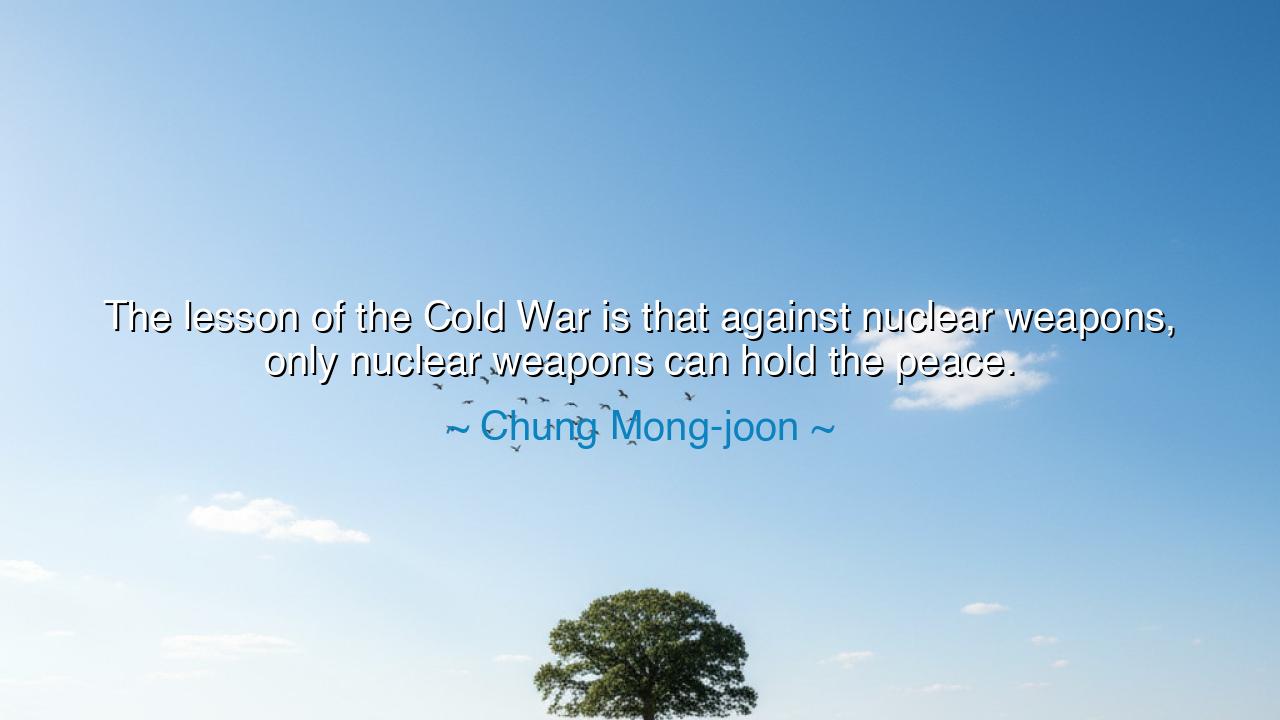
The lesson of the Cold War is that against nuclear weapons, only
The lesson of the Cold War is that against nuclear weapons, only nuclear weapons can hold the peace.






The words of Chung Mong-joon—“The lesson of the Cold War is that against nuclear weapons, only nuclear weapons can hold the peace.”—are heavy with the paradox of our age. They speak of a truth that is both terrifying and sobering: that the most destructive force ever devised by humankind has become, by grim necessity, the shield that prevents even greater destruction. This is not the peace of harmony or goodwill, but the uneasy peace of deterrence, a balance of terror in which neither side dares strike because the cost would be the annihilation of both.
The Cold War itself was the proving ground of this lesson. For nearly half a century, two great powers—the United States and the Soviet Union—stood locked in rivalry. Each possessed enough nuclear fire to scorch the earth many times over. Yet, despite proxy wars, threats, and crises, neither side dared unleash the full fury of its arsenal. Why? Because each knew the other held the same weapon, and that to strike first would be to sign one’s own death warrant. This logic of “mutually assured destruction,” dark though it may be, preserved a fragile peace.
Consider the Cuban Missile Crisis of 1962. The world stood on the brink of destruction as Soviet missiles were placed in Cuba and American ships enforced a blockade. For thirteen days humanity held its breath. Yet in the end, war did not come. Both sides stepped back, not out of love for one another, but out of fear of nuclear devastation. It was the very presence of nuclear arms on both sides that forced caution, making leaders tread carefully where otherwise they might have marched boldly into war. Here, the grim truth of Chung’s words revealed itself.
Yet this lesson is not one of triumph, but of sorrow. For to say that only nuclear weapons can hold the peace is to admit that mankind has not yet risen above fear as its guardian. Instead of love or justice securing our safety, it is terror that restrains us. This peace is like a prisoner in chains—secure for the moment, but never truly free. And so the question remains: will humanity forever depend on the threat of mutual destruction, or will it one day discover a higher way?
The ancients too knew of such paradoxes. The Romans said, “If you want peace, prepare for war.” They understood that strength deters attack, even while it tempts the pride of nations. In this sense, the nuclear balance is but the modern form of an old truth: that fear of destruction can stay the hand of the aggressor. Yet, the ancients also dreamed of peace born of virtue, when swords would be beaten into plowshares. Chung’s words remind us that for now, humanity still lives in the shadow of the first truth, not yet in the light of the second.
The lesson for us, children of this age, is sobering. We must acknowledge that deterrence has preserved peace, but we must not grow complacent in it. To rely on weapons of annihilation as the foundation of order is to build upon sand. One error, one miscalculation, one madness could undo the fragile balance. Therefore, while accepting the reality of deterrence, we must also labor for disarmament, diplomacy, and the cultivation of trust between nations. The weapons may hold back war, but only trust and compassion can create true peace.
Practically, this means urging leaders to pursue arms reduction with courage, supporting institutions that foster dialogue instead of conflict, and raising a generation that does not see nuclear terror as the only possible safeguard. It means remembering the horror of Hiroshima and Nagasaki, so that the world never again unleashes such fire. And it means teaching ourselves and others that the highest peace is not born of fear, but of justice and love.
So let Chung Mong-joon’s words stand as both reminder and warning: “Against nuclear weapons, only nuclear weapons can hold the peace.” Remember this paradox, and do not rest in it. For fear may hold war at bay, but only the higher virtues of mankind can replace fear with harmony. Until that day comes, let us guard our steps with caution, but strive always to rise above the shadows into a brighter peace, where weapons are no longer the guardians of the world.






AAdministratorAdministrator
Welcome, honored guests. Please leave a comment, we will respond soon